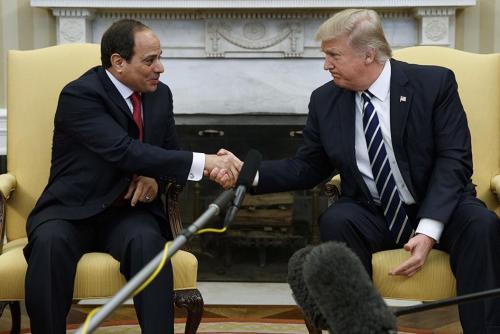US: Don’t Green Light Egypt’s Repression
Congress Should Act to Uphold Law
Egyptian President Abdel Fattah al-Sisi’s visit to the White House on April 9, 2019 comes at a time when his government has been stifling dissent before a planned constitutional referendum that will institutionalize repression, Human Rights Watch said on April 09, 2019.

President Donald Trump shakes hands with Egyptian President Abdel Fattah al-Sisi in the Oval Office of the White House in Washington.
United States President Donald Trump has repeatedly avoided raising human rights concerns in Egypt and instead praised al-Sisi for doing “an outstanding job” in fighting terrorism. Instead of allowing al-Sisi to return from Washington without any condemnation of his policies, members of Congress should make clear that Egypt’s ongoing repression and abuse will be met with serious restrictions on military aid that are dependent on substantial reforms and human rights improvements.
“President al-Sisi is in Washington to obtain a green light for proposed constitutional amendments that grant the military highly abusive powers and further institutionalize authoritarianism,” said Michael Page, deputy Middle East and Northern Africa director at Human Rights Watch. “Given President Trump’s silence on abuses, Congress should step up and condemn this initiative.”
Al-Sisi’s meeting with Trump will be the sixth in the past 30 months. But it is al-Sisi’s first visit to the White House since his reelection for a second term in the March 2018 presidential vote, which was held in an environment that was largely neither free nor fair.
The proposed constitutional amendments, which are expected to be put for a public vote the last week in April, include articles that would constitutionally undermine an already-weak judicial independence and increase the military control of the public and political spheres.
Al-Sisi, who was officially elected in May 2014, has presided over the worst human rights crisis in Egypt in recent decades, including near-total impunity for abuses by the military and security forces and severe restrictions on civil and political rights. His administration has effectively erased the gains of the 2011 uprising that ousted the longtime authoritarian ruler Hosni Mubarak.
Al-Sisi rose to power in July 2013 when, as the defense minister, he led the army to unseat Egypt’s first-freely elected president, Mohamed Morsy.
Between Morsy’s overthrow and May 2014, the independent Egyptian group Wikithawra documented the arrest or prosecution of 41,000 people. In addition, 26,000 more may have been arrested in 2015 and 2016, lawyers and human rights researchers have said. The nationwide crackdown quickly widened to include scores of writers, journalists, artists, and political and human rights defenders for their peaceful criticism.
Unfair mass trials, whether before military or civilian judges, have been held for thousands of dissidents. According to the Committee for Justice, a Geneva-based human rights organization, Egyptian courts have handed down at least 2,500 initial death sentences in criminal and political cases in the last few years. Although many of these verdicts have been overturned, Egyptian authorities have executed at least 180 people since 2013.
Military operations in Sinai against Islamic militants have escalated and have been fraught with gross abuses. Egyptian military and Interior Ministry forces have committed torture, enforced disappearances, and likely extrajudicial killings. In 2018 alone, the Egyptian army has destroyed hundreds of hectares of farmland and at least 3,000 homes and commercial buildings. Almost all the buildings in Rafah, a city on the borders with Gaza and Israel that used to host roughly 70,000 residents, have been razed.
For almost four decades, Egypt has received substantial assistance from the US, including US$1.3 billion in annual military aid.
The US administration did not designate the forcible removal of Morsy by the army in 2013 as a military coup. It was not until after security forces killed more than 817 people while dispersing a sit-in opposing Morsy’s removal in Cairo’s Rab’a Square on August 14, 2013, that the administration undertook a review of military aid to Cairo and temporarily suspended the delivery of major weapons systems. The delivery of weapons resumed as normal shortly after even though no government official or member of the security forces has been held accountable for the mass killings.
Since at least 2012, Congress has conditioned military aid to Egypt on taking various steps toward supporting human rights and a democratic transition to civilian government. But in every year but one, Congress has allowed the secretary of state to waive those restrictions based on US national security interests.
The al-Sisi government’s long arm of repression has targeted American citizens too. In November 2018, Human Rights Watch documented the case of Khaled Hassan, an American Egyptian who was severely tortured, including with electric shocks, and raped while in one of the secret detention centers of the Interior Ministry. “I’ve been paying taxes for years as a US citizen,” Hassan told Human Rights Watch in an interview last year. “I feel like I’ve been sponsoring my own torture this whole time.”
“In the absence of a US executive willing to address Egypt’s serious downward trajectory, Congress needs to use its levers to pressure the Egyptian president to reverse course, starting with withdrawing these constitutional amendments set to consolidate authoritarian rule,” Page said.
Source:Human Rights Watch
- 335 reads
Human Rights
Ringing FOWPAL’s Peace Bell for the World:Nobel Peace Prize Laureates’ Visions and Actions

Protecting the World’s Cultural Diversity for a Sustainable Future

The Peace Bell Resonates at the 27th Eurasian Economic Summit

Declaration of World Day of the Power of Hope Endorsed by People in 158 Nations

Puppet Show I International Friendship Day 2020

